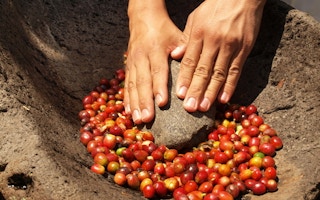Nestlé, the world’s largest fast-moving consumer goods company, has vowed to continue investing in the country’s coffee sector through the grant of subsidies to Philippine coffee farmers to increase their production and ensure sustainability of its supply.
Nandu Nandkishore, Nestlé executive vice president for Asia, Oceania, Africa and Middle East said at the session on “Rethinking Economic Growth” at the World Economic Forum in Makati, that creating shared value with society has been part of the company’s philosophy to ensure sustainability of its operations.
According to Nandkishore, Nestlé has distributed almost 10 million coffee seedlings to Filipino farmers over the past 10 years subsidized cost. In the first five months of the year alone, the Swiss company has distributed 2 million seedlings in partnership with the Department of Agriculture.
“The idea is to encourage farmers to grow coffee and make this an economic viable proposition and increase coffee output because coffee is very suited in the Philippines,” he said.
“
The Philippines produces 20,000 tonnes of green coffee annually as against domestic demand of 100,000 MT. This means majority of the country’s coffee is imported. Coffee production has also been affected by natural disasters that hit Visayas and Mindanao
“The Philippines is our biggest market in Southeast Asia and we are investing consistently over the years and if you think our philosophy of creating shared value for society and at same time for the shareholders,” he said.
The Philippines produces 20,000 tonnes of green coffee annually as against domestic demand of 100,000 MT. This means majority of the country’s coffee is imported. Coffee production has also been affected by natural disasters that hit Visayas and Mindanao.
Comparatively, Vietnam has annual coffee production of 1.5 million tonnes. Vietnam earns estimated exports of $3.4 billion to $4 billion for the exports of 1.5 million tons of coffee.
“We are investing to increase capacity in our farmers and people in this country as part of shared value philosophy,” he said
The Philippines is Nestlé’s biggest operation in southeast Asia and one of its top 10 biggest market worldwide.
Today, the local unit exports infant nutrition, breakfast cereals, Milo, among other products produced from its plants here.
In 2010, Nestle invested P4.3 billion for a new factory in Tanauan, Batangas. The plant is now producing Coffee-Mate, a non-dairy creamer, and Bear Brand powdered milk drink. The investment was meant to support strong growth for both products.
The domestic market demand in 2010 for BEAR BRAND and COFFEE-MATE is projected to grow by 19 per cent and 8 per cent, respectively, with BEAR BRAND exports under the brand name EVERYDAY seen to grow by 38 per cent. It also created additional jobs for 170 people.
Apart from the Batangas factory, Nestlé has other manufacturing facilities in Cagayan de Oro, Cabuyao, Lipa and Pulilan, especially in technology and equipment to enable the company to meet increasing demand for its products.
Nestlé’s local investments for the period 1995-2010 totaled close to P10 billion, with about 80 per cent allocated for existing facilities to generate higher efficiencies and to protect the environment, while the balance 20 per cent was deployed into sales infrastructure, distribution, and IT systems.
In 2009, Nestlé Philippines produced almost half a million metric tonnes of coffee, milk, beverages, non-dairy creamer, food, infant nutrition, ice cream, chilled dairy, and breakfast cereals.
The Nestlé business in the Philippines has grown in the last five years by an average of P4.6 billion annually. With sales of almost P86 billion in 2009, the company paid some P10.6 billion in taxes, a 20 per cent increase over 2008. Nestlé is the largest corporate taxpayer in the Philippines for 2009 and is among the top eight largest corporations in the country.

















